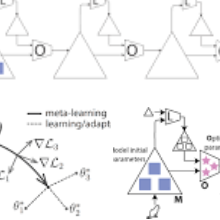Deep-learning techniques have been successfully used for time-series forecasting and have often shown superior performance on many standard benchmark datasets as compared to traditional techniques. Here we present a comprehensive and comparative study of performance of deep-learning techniques for forecasting prices in financial markets. We benchmark state-of-the-art deep-learning baselines, such as NBeats, etc., on data from currency as well as stock markets. We also generate synthetic data using a fuzzy-logic based model of demand driven by technical rules such as moving averages, which are often used by traders. We benchmark the baseline techniques on this synthetic data as well as use it for data augmentation. We also apply gradient-based meta-learning to account for non-stationarity of financial time-series. Our extensive experiments notwithstanding, the surprising result is that the standard ARIMA models outperforms deep-learning even using data augmentation or meta-learning. We conclude by speculating as to why this might be the case.
翻译:深入学习技术被成功地用于时间序列预测,并经常显示许多标准基准数据集与传统技术相比的优异性能。我们在这里对金融市场价格预测的深层学习技术的绩效进行了全面而比较的研究。我们根据货币和股票市场的数据基准了先进的深层学习基线,例如NBeatats等。我们还利用由技术规则驱动的模糊的基于需求的模式,例如移动平均值,来生成合成数据,贸易商经常使用这种标准平均值。我们用这一合成数据作为基准技术的基准,并将其用于数据增强。我们还应用基于梯度的元学习来计算金融时间序列的不常态性。尽管我们进行了广泛的实验,但令人惊讶的结果是,标准的ARIMA模型即使使用数据增强或元学习,也优于深层学习。我们最后通过猜测为什么会发生这种情况。



